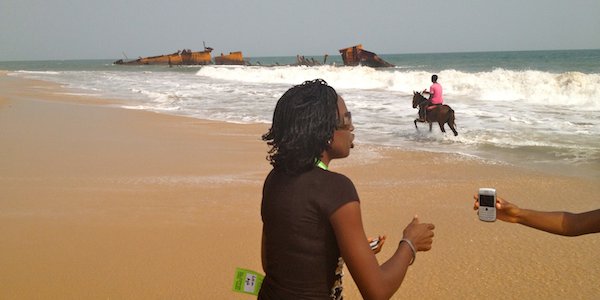Think agile, think beta: a new approach to journalism training

South Africa here I come! Goethe-Institute South Africa and Siemens Stiftung have invited j-hub to facilitate a Music in Africa workshop on the future of music journalism. As preparation I thought I'd take a look at what we learnt in our last j-hub workshop.
In March this year, Sourcefabric's eco j-hub collaboration with its partners (Goethe Institue Nigeria, PixelChiefs and XMLab) in Lagos, Nigeria made news all over the country for its blend of investigative journalism, ecological education and influence on policy.
But there was one thing that many of the television channels, radio stations and national newspapers missed. The workshop that led to the initiative's launch took an innovative approach to how journalists should be trained, an approach that looks set to be adopted by several other initiatives across West Africa and beyond.
eco j-hub was originally intended to be a week-long workshop in Lagos, Nigeria's most populous and tech-savvy city. It ended up as something quite different – an international network of news innovators, a digital newsroom focusing on environmental issues, and a community platform for Nigerian bloggers, activists and commentators.
Without the amazing participants, who came from the very different backgrounds of TV, radio, print and online journalism, the project would have been very different. So how did they spur each other on to achieve so much in only a week and what lessons did we learn about how to make workshops more efficient, engaging and productive? Here's what we did, and how we'd love to make it better next time.
The games we play...
As organisers we tried to apply the risks and rewards of gaming to stimulate discussion and structure learning objectives. Each day of eco j-hub was named after an aspect of gaming culture, and each day was structured as a new 'level' with completion of manageable tasks, application of acquired skills and team-play used as ways to achieve ratings, progression and even power-ups.
This appealed to the journalists' innate competitive nature, encouraged collaboration and raised engagement. When boredom did set in, it was because the challenges set were not challenging enough or not well enough explained. Overall, breaking down each day into clear, rewardable goals gave much greater focus than a simple pass/fail outcome, or indeed no clear outcome at all.
Train the trainers, minute by minute
It's an oft-used adage in workshop circles but 'train the trainer' is often used with a long term, 'capacity-building' strategy in mind. Our aim was to inject even the everyday tasks with the necessity to collaborate. Some tasks couldn't be achieved without teaming up, others rewarded team efforts with bonus points. The aim was to simulate the modern journalist – freelance, networked, project-oriented and ready to outsource.
As much as we could we avoided situations of one-to-many presentations. Where they were required, we made this a participant-led learning process in itself, ensuring that they were 60 seconds in length, delivered like an editorial pitch, made to a live camera and had headlines that were tweetable. Striking a balance between talking to the YouTube generation and maintaining traditional journalistic integrity was not always easy, but facilitated by exchange between the various types of journalists present.
Bring an agile mentality
Having all worked in software at some point or other, the organisers brought an agile mentality into the workshops. Stand-up meetings were employed to break the ice, provide status updates and discuss crucial editorial policy.
Schedules were driven by participants and given enough flexibility to revisit or skip skills training as appropriate. Continual evaluation of the mission and journey helped to keep us all on track.
Don't be afraid to be distracted
Sometimes the most valuable objective arrives via the least obvious route. Be prepared to encounter unexpected but valuable knowledge in strange places and turn distractions into opportunities.
Losing attention to mobile devices and social media is always a threat in workshops, so we tried to turn it around and make the inevitable Facebook checking part of the process. Participants crowdsourced help, got feedback and collated information under a workshop hashtag, and used Facebook to drive traffic and test reception to articles before publishing.
Make it live
Be transparent in your activities and make them mission critical. Part of eco j-hub involved the establishment of ecojournalism.org. The site was online and public from day one, meaning any contribution and training was done in a live scenario. This raised the stakes and gave an immediate real-life application to the workshop.
In addition, the training was performed on a beta version of Newscoop, Sourcefabric's CMS for journalists. Getting journalists to document bugs and input into development allowed them to get closer to the software process and understand the possibilities (and the limitations) of the tools they use. Frustration with glitches was turned on its head – the participants were actively building a tool that would benefit them and others around the world.
Take a critical eye
More than is expressed here, criticism was a vital element of the training for both organisers and participants. Participants used self-criticism to improve and help others, while – as organisers – it was vital to remain alert to potential improvements and new workshop directions.
Refining the process was important and round-table sessions were held daily to air grievances and difficulties. As organisers, we learnt it's important to also feel listened to. Bringing frustration into a learning environment benefits no-one and eco j-hub's flexible, beta mentality required valuable downtime.
- To follow progress at the Music in Africa workshop, held in Johannesburg next week, follow me on Twitter.
- Sign up to our #newsbeta newsletter, where coders and journalists work together to build next-gen technologies.
